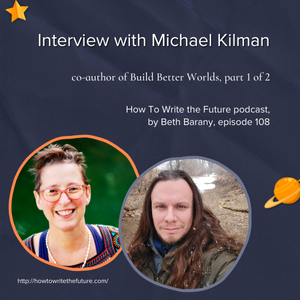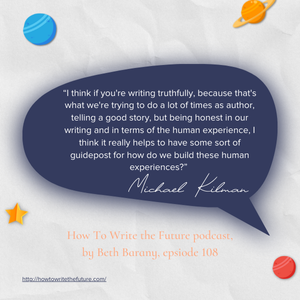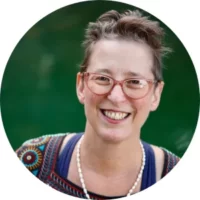Interview with Michael Kilman, co-author of Build Better Worlds, part 1 of 2
Interview with Michael Kilman, co-author of Build Better Worlds, part 1 of 2 – How To Write the Future podcast, episode 108
“I think if you’re writing truthfully, because that’s what we’re trying to do a lot of times as author, telling a good story, but being honest in our writing and in terms of the human experience, I think it really helps to have some sort of guidepost for how do we build these human experiences?” – Michael Kilman
Following on from the mini series where podcast host Beth Barany delved into the book Build Better Worlds by Michael Kilman and Kyra Wellstrom, in this latest episode Beth chats to co-author Michael Kilman about his history and interest in anthropology and how it helped shape chapters of the book, titled “Interview with Michael Kilman, co-author of Build Better Worlds, part 1 of 2.”
Platforms The podcast is available on Apple Podcasts | Buzzsprout | Spotify | Podcast Addict | Amazon Music | Youtube
RESOURCES
Build Better Worlds: An Introduction to Anthropology for Game Designers, Fiction Writers and Filmmakers by Michael Kilman and Kyra Wellstrom https://books2read.com/bbwhtwtf
Playlist for Build Better Worlds HTWTF Mini-series:
https://youtube.com/playlist?list=PLFt3x70-_d9J3YFYX5x630CwrsJ5gTml0&si=4lIavBcopfu4hVKn
Free World Building Workbook for Fiction Writers: https://writersfunzone.com/blog/world-building-resources/
Sign up for the 30-minute Story Success Clinic with Beth Barany: https://writersfunzone.com/blog/story-success-clinic/
Get support for your fiction writing by a novelist and writing teacher and coach. Schedule an exploratory call here and see if Beth can support you today: https://writersfunzone.com/blog/discovery-call/
About the How To Write the Future podcast
The *How To Write The Future* podcast is for science fiction and fantasy writers who want to write positive futures and successfully bring those stories out into the marketplace. Hosted by Beth Barany, science fiction novelist and creativity coach for writers. We cover tips for fiction writers. This podcast is for readers too if you’re at all curious about the future of humanity.
This podcast is for you if you have questions like:
– How do I create a believable world for my science fiction story?
– How do I figure out what’s not working if my story feels flat?
– How do I make my story more interesting and alive?
This podcast is for readers too if you’re at all curious about the future of humanity.
ABOUT Michael Kilman
Michael Kilman is an author and anthropologist. He lectures at the University of Colorado at Denver and is host of the YouTube series Anthropology in 10 or Less. His graduate research focused on the Romero Theater Troupe, a community organization that seeks to address stereotypes in media and gives a space for individuals to share their stories and represent themselves. After teaching anthropology for 9 years and working with 25 native American Tribes over the course of ten years, Michael published four science fiction novels in a series called The Chronicles of the Great Migration. His most recent co-written book, Build Better Worlds: An Introduction to Anthropology, for Game Designers, Fiction Writers, and Filmmakers, uses the social science of anthropology to help people with fictional worldbuilding. As a documentary filmmaker Michael has produced several documentaries including the short form pieces titled Native American History in Colorado and the Language Hunters. His long form documentaries include Unbound: The Story of the Romero Theater Troupe and The Crossroads at Stonewall. Michael Gave a Ted Talk in September 2021 titled, Anthropology, Our Imagination, and How to Understand Difference. Michael was elected President of the High Plains Society for Applied Anthropology in 2020 and served as president until May 2022. He is currently working on a Dark Fantasy/Horror novel titled Shades and Shapes in the Dark.
Facebook: https://www.facebook.com/michael.kilman.5
LinkedIn: https://www.linkedin.com/in/michael-kilman-m-s-075b7110/
Tiktok: https://www.tiktok.com/@authormichaelkilman
Website: http://loridianslaboratory.com
Transcript for Michael Kilman, Co-Author of Build Better Worlds, part 1 of 2
Hello everyone. Welcome back or welcome to How to Write the Future Podcast. I’m your host, Beth Barany. I’m a creativity coach for writers and a science fiction and fantasy writer. I run this podcast because I believe that as writers, we can create positive, optimistic futures because when we do, we actually help shape the world through our stories.
Also by being a writer and thinking deeply about humanity and new cultures that we put into our stories, we can also reshape ourselves.
Introducing Today’s Guest, Michael Kilman
Today I have a special guest with me, Michael Kilman, an author, and I’m gonna tell you about his book, Build Better Worlds, in a moment.
But I just wanna welcome you in, Michael. Thank you so much for joining us today.
Thank you for having me.
Yeah, this will be fun. So I am gonna introduce y’all to Michael, and for those of you watching on YouTube, you’ll be able to see our faces So here is, Michael’s bio, and I’ll just say that this book Build Better Worlds, which I’m gonna be talking a lot about and holding it up probably a few times, with all my post-Its, is called Build Better Worlds: an Introduction to Anthropology for Game Designers, Fiction Writers and Filmmakers, and it’s co-written. Michael co-wrote this book with Kyra Wellstrom and, Kyra can’t be with us today, so we’re gonna have to have another conversation with her later.
So about Michael.
About Michael
Michael is an author and anthropologist. He lectures at the University of Colorado at Denver and is host of the YouTube series, anthropology in 10 or less. His graduate research focused on the Romero Theater Troupe, a community organization that seeks to address stereotypes in media and gives a space for individuals to share their stories and represent themselves.
After teaching anthropology for nine years and working with 25 Native American tribes over the course of 10 years, Michael published four science fiction novels in a series called The Chronicles of the Great Migration. His most recent co-written book, Build Better Worlds and Anthropology: An Introduction To Anthropology For Game Designers, Fiction Writers And Filmmakers uses the social science of anthropology to help people with fictional world-building. As a documentary filmmaker, Michael has produced several documentaries, including the short-form pieces titled Native American History in Colorado: The Language Hunters. His long-form documentaries include Unbound, the story of the Romero Theater Troupe, and the Crossroads at Stonewall.
Michael gave a TED Talk in September 2021 entitled Anthropology, our Imagination, and How to Understand the Difference. Michael was elected president of the High Plains Society for Applied Anthropology in 2020 and served as president until May 2022. He’s currently working on a dark fantasy horror novel titled Shades and Shapes in the Dark.
On To The Interview
Wow. So cool. Welcome Michael. I’m so excited to talk with you. I love this wide range of-you’ve done so many things. I didn’t realize that it didn’t quite register that you’ve done, film making and, and also all the fiction you’ve created. So, so fun, lots to talk about. Thanks again for being here Gosh, where do I begin?
I have a lot of questions for you and you also gave me some fabulous prep questions to start with. backing up a little bit about you: like why anthropology? Why did you decide to study anthropology?
I think I’m just a really curious person. I like to engage and study different aspects of the human experience. When I was in high school, I had aspirations of being a rock star and various other things. It started out my college career in music, but, switched a whole bunch of times and randomly took an anthropology class and realized this is what feeds my curiosity.
Really understanding how people tick and as long as I can remember, I was always very interested in other cultures and other experiences. I was always very aware that there were a lot of different ways of being in the world. I was also, like everybody else, I grew up in my little bubble.
And once I got outside of that bubble, I just became fascinated with all the different kinds of ways of thinking about the world.
Oh, that’s wonderful. I have a similar eclectic upbringing and always curious about other cultures. I was almost an anthropology major in college but ended up doing an interdisciplinary degree.
You’ve really dug in, you’re not just studying, but you’re creating things- your documentaries, your novels, the nonfiction book. And you mentioned before when we were in the green room that you’re considering doing another edition. a second edition, is that right?
Yeah, we wanted to, I think there’s a couple of chapters we wanted to expand. And there was a couple of chapters that when we originally did the book we had talked about, but it’s already 400 pages. How much longer do we wanna make this thing? there’s also been some changes, in the fossil record and those kinds of things.
and that’s Kyra. Kyra is the biological anthropologist. She specializes in forensics. That’s where her graduate research is. She did all of the very wonderful biological and environmental chapters and, some of the cultural ones too, like the gender chapter and the health chapter as well.
So she did a lot of the stuff that deals with much more with the physical realities Of being a human. I leaned more towards the cultural, however. We both argued who got to write the Monster chapter because we both wanted to do it.
Yeah. Oh my goodness.
So we collaborated on that.
All of our chapters basically were because we both have taught many subjects in anthropology. But we both have been teaching, actually, really I’m coming up on my decade anniversary of teaching now. So, she’s a very well-versed person in these areas.
and we would basically write the first draft of the chapter and then handed over to the other person and have them edit it and add what they knew from the topic. It was very collaborative and she was a wonderful co-author to work with.
Oh, that’s fabulous. Yeah. And just due to technical difficulties, Kara couldn’t be here today, so we’ll definitely have to have her back. so listeners know, I did four episodes on four different sections in your book and like one on economics, one on just the whole notion of context, one on religion.
I’m spacing on the fourth. I found it so juicy. And your book has -just a big plug for your book-. Great thinking questions. And so I was taking your questions and asking the listeners, how does this apply to your story world? yeah. Such great food for thought.
I really encourage everyone to check out the book. Why is anthropology and social science important for people to consider in their fiction and world building?
I think. If you’re writing truthfully, because that’s what we’re trying to do a lot of times as author, telling a good story, but being honest in our writing and in terms of the human experience, I think it really helps to have some sort of guidepost for How do we build these human experiences?
How do we think about how humans organize and move through the world? How do people get biases? Or how do they overcome those things or how do things change? and looking at that in authentic ways. you can do this of course, by going out into the world and experiencing cultures, but
We know that not everybody has that kind of privilege to be able go out and travel and do things, Yeah.
I understand how difficult it can be to get out of the house, but we wanted to give people an opportunity to really explore some of those core concepts. This is not a complete guide, and it certainly doesn’t cover every aspect of anthropology. It would have to be thousands of pages long for that. It’s a good introduction and we really thought that even just getting a little social science knowledge into people’s head would be really useful, especially when they’re crafting worlds from scratch.
It’s one thing to write about our own world and you can certainly observe a lot of things. to build a fantasy world from scratch, for example, is a huge undertaking.
As anyone who’s tried to do it as, like myself has known, you spend many hundreds of hours thinking about how does this world function. It’s useful to know how the human world functions. Even if you’re writing a reptilian species or something like that, it’s useful understand how the biological elements of yourself impact the creation of culture and how the environment impacts the creation of culture, and how culture can be an adaptive tool for survival.
I love what you just said. Those three things are really basic elements and when we’re in our day-to-day lives, or even, I’ve met writers who they’ll think a lot about their characters, but they won’t necessarily think about why the world that they just came to them through their imagination might be shaped that way even.
A piece of guidance that I like to always give is think of your point of view character. Your point of view character knows what they know, and start with them, interview them, and ask them what do they know. And if I were to ask you, so you know, the way your city is laid out, do you know why it’s laid out that way?
And you may or may not know, right?
Right.
But you might have some ideas about how cities get built and that’s enough cultural knowledge to, to, if you’re writing from point of view character who only knows, generally in our, cities are built like this, then that is part of your character’s understanding of culture and you can use that to, to build upon.
Yeah, and I think it’s great to focus on your characters. I think characters are the core and backbone of your world, but like a real person, your character is going to be limited in their knowledge and experience. And having those limitations is part of the story. If your character knows everything there is to know about the world, there’s no room for them to grow.
In reality, as individuals, we’re pushed and pulled by cultural systems in ways that we don’t know or understand. And I think as Americans, we don’t like to hear that. We really don’t like the idea that the culture determines so much of the ways we think and move through the world because we wanna just really focus on that individual.
I remember after I finished grad school, I ended up doing some mock jury for trying to make some money in the meantime. And I remember thinking, I’ve got a graduate degree. These lawyers can’t push me in one direction or another. And I found in this mock jury, which they’re very much using to try to figure out how to phrase their argument for court.
This is, when you have a wealthy client, they have the means to do this. They very much led me by the nose and I realized it at the end and I was like, oh my God. They very much manipulated me and used my blind spots and I was like, here I have an advanced degree. Cultural systems push us in directions that we don’t understand.
And I think, when you’re building a fictional world, you need to understand what cultural forces are gonna be putting pressure on your characters that they don’t necessarily understand. We all function that way. We don’t really understand everything we do.
Some of us end up in therapy to try to figure out why we do the things we do, right? You could be your character’s therapist and sorts, and like how did they get this way? How did their childhood, how did the historical context, how did all these things lead up to them thinking in this particular way at this particular moment?
Write Long and Prosper
That’s it for this week. Stay tuned to next week where I continue my conversation with Michael, about his book, Build Better Worlds.
And I just wanna tell all of our listeners to write long and prosper.
Loved this episode? Leave us a review and rating here: https://www.buzzsprout.com/2012061
ABOUT BETH BARANY
Beth Barany teaches science fiction and fantasy novelists how to write, edit, and publish their books as a coach, teacher, consultant, and developmental editor. She’s an award-winning fantasy and science fiction novelist and runs the podcast, “How To Write The Future.”
Learn more about Beth Barany at these sites:
Author site / Coaching site / School of Fiction / Writer’s Fun Zone blog
CONNECT
Contact Beth: https://writersfunzone.com/blog/podcast/#tve-jump-185b4422580
Email: beth@bethbarany.com
LinkedIn: https://www.linkedin.com/in/bethbarany/
IG: https://www.instagram.com/bethbarany/
TT: https://www.tiktok.com/@bethbarany/
FB: https://www.facebook.com/bethbarany
X: https://twitter.com/BethBarany
CREDITS
- EDITED WITH DESCRIPT: https://www.descript.com?lmref=_w1WCA (Refer-a-Friend link)
- MUSIC CREDITS : Music from Uppbeat (free for Creators!): https://uppbeat.io/t/soundroll/fuzz-buzz License code: UMMKDRL02DFGKJ0L. “Fuzz buzz” by Soundroll. Commercial license: https://musicvine.com/track/soundroll/fuzz-buzz.
- DISTRIBUTED BY BUZZSPROUT: https://www.buzzsprout.com/?referrer_id=1994465 (Refer-a-Friend link)
- SHOW PRODUCTION BY Beth Barany
- SHOW CO-PRODUCTION + NOTES by Kerry-Ann McDade
C 2024 BETH BARANY
For more “How To Write the Future” episodes, go here.




